 Blogs
Blogs
June 20, 2024 • 8 min read
According to the UN Refugee Agency (UNHCR), an estimated 117.3 million people were forcibly displaced in 2023. The scale of the global displacement crisis is unprecedented. Today, more people are displaced than at any other point in modern history. GOAL recognises that seeking asylum is a fundamental right. On this World Refugee Day, we reaffirm our commitment to supporting and protecting displaced communities around the world.
The Crisis in Numbers
Today, 37.6 million people have been forcibly displaced from their country of origin and live abroad as refugees. An additional 68.3 million people have been forcibly displaced from their homes but remain within their country’s own borders. These individuals are referred to as internally displaced people, or IDPs. 47 million children worldwide are currently experiencing displacement.
One in every 69 people are displaced. This is 1.5% of the world’s total population. Nearly double the figure from ten years ago, when 1 in 125 people were displaced. Alarmingly, the number of people who have been forcibly displaced by conflict, persecution, economic turmoil, or climate change has increased every year for the past twelve years.
The interconnected nature of climate change and displacement indicates that displacement will only continue to increase in magnitude and intensity. Notably, climate-related natural hazards triggered more than 50% of reported displacements in 2022, and 60% of displaced people live in a country that is vulnerable to climate change, according to the UNHCR.
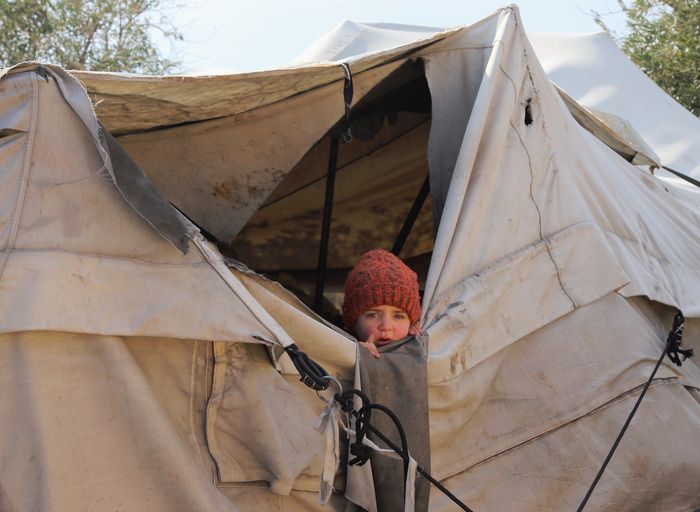
A young child experiencing displacement in Northwest Syria. 40% of all displaced individuals worldwide are children.
Supporting Displaced Communities Around the World
Mass displacement is one of the most challenging and pressing humanitarian challenges of the modern era. Displaced communities are uniquely vulnerable to food insecurity, disease, economic exclusion, and gender-based violence. Often living in informal settlements with limited access to basic services, the humanitarian needs of displaced communities are enormous.
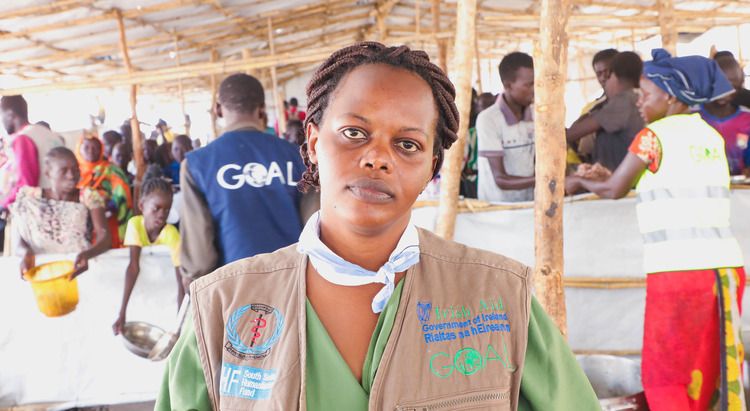
A GOALie in Joda border crossing, Renk County, South Sudan, supporting an influx of South Sudanese returnees and Sudanese refugees fleeing conflict.
Syria
The ongoing conflict has displaced over 14 million people since 2012, including 7.2 million IDPs. A crisis compounded by the catastrophic 7.8 magnitude earthquake that struck last February, displacing 86,000 people and destroying thousands of homes.
GOAL is one of the largest providers of humanitarian assistance in Northwest Syria. GOAL teams are supporting thousands of displaced households in Idleb and Aleppo every month with emergency food assistance.
Displacement camps are overcrowded and poorly connected to critical infrastructure, including water networks. Thankfully, with the support of generous donors, GOALies are repairing water pipes damaged by the conflict. Ensuring displaced families can easily access safe drinking water and dignified hygiene facilities.
GOAL teams also distribute multi-purpose cash assistance to displaced households, so they can purchase food, cooking supplies, clothes, and medicine. This is especially vital during Syria’s harsh, unforgiving winters, when households are in dire need of warm clothes, blankets, new tents, firewood, and other household items.
Read more about GOAL’s work in Syria.
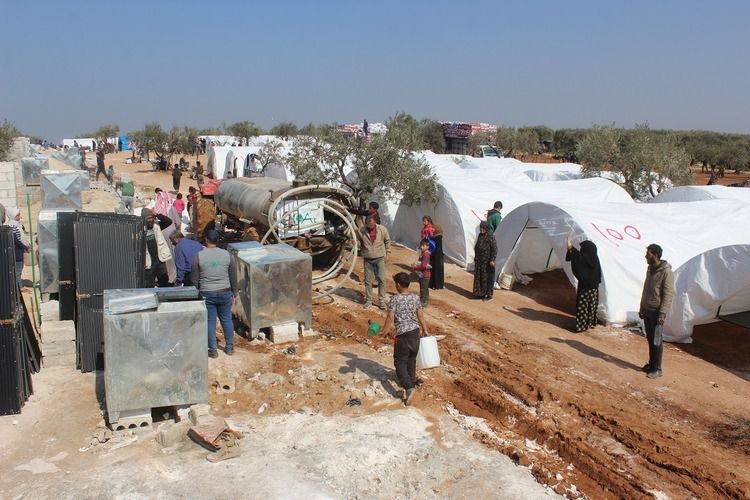
GOALies providing emergency water trucking to IDPs in Al Rahma refugee camp, where displaced households do not have reliable access to clean drinking water.
Türkiye
Türkiye hosts 3.7 million Syrian refugees – more than any other country in the world. GOAL has been operational in Southern Türkiye since 2016, implementing development programmes to improve the quality of life for Syrian refugees.
Syrian refugees in Türkiye experience a host of challenges, including a number of barriers to accessing formal and dignified employment. Informal work is common and characterised by exploitation and low wages. Discrimination and social exclusion are contributing factors to the high rates of poverty among refugee communities in Türkiye.
Navigating the Turkish legal system is a significant challenge for Syrian refugees. Many households are unable to obtain the documentation that would allow them to apply for legal employment or enroll their children in school.
To address these challenges, GOAL teams in Türkiye offer Turkish language classes, life-skills and vocational training, employment support, and legal counselling to Syrian refugees. This ensures that displaced households can earn a stable income and support their own basic needs.
Read more about GOAL’s work in Türkiye.
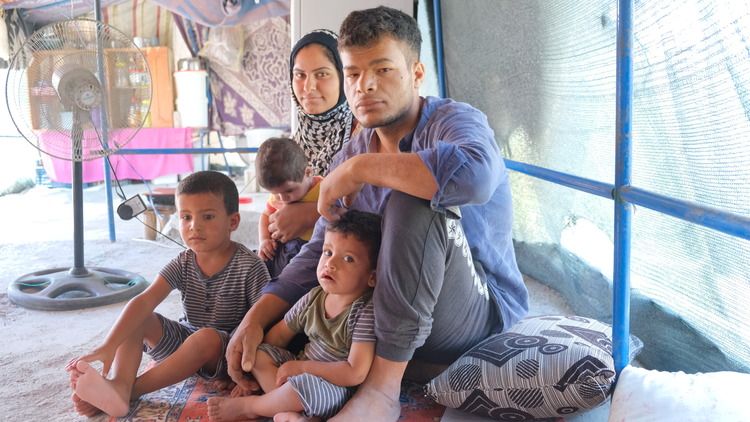
Two Syrian refugees, Mahir and Hatun, with their three children. When Hatun gave birth to their youngest child, Yusuf, the baby was taken away by Turkish authorities due to registration issues. With legal support from GOAL, the family was reunited.
Latin America
In Latin America, record high numbers of migrants are crossing the Darién Gap, a 100 kilometre stretch of treacherous jungle and extremely hazardous terrain between Colombia and Panama. These South American refugees are fleeing severe economic crisis, political instability, and civil unrest or violence.
GOAL teams in Colombia and Honduras are coordinating a response to address the urgent needs or refugees passing through the Darién Gap and entering Central America. A record 520,000 people traversed the Darién Gap in 2023, and over 800,000 refugees are expected to cross in 2024.
The Darién Gap is extremely dangerous. Refugees are vulnerable to physical injury, theft, human trafficking, kidnapping, gender-based violence, and death. When refugees arrive in Panama, they require urgent nutritional, medical, psychosocial, and financial support. The crisis is generating a level of humanitarian need that exceeds the resources of local governments and agencies in Central America.
GOAL teams in Colombia and Honduras are addressing these challenges by supporting refugees with food, water, sanitation products, financial assistance, and psychological first aid. This reduces the risk of exploitation, psychological trauma, and crisis levels of malnutrition among refugee populations.
Read more about GOAL’s work in Latin America.
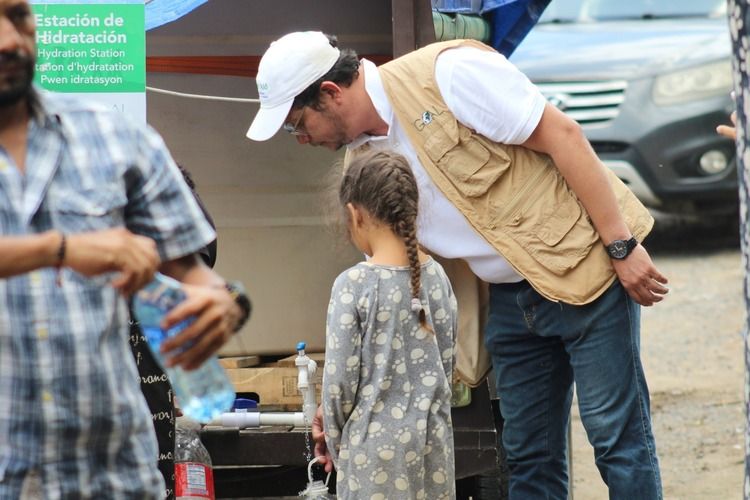
A GOALie in Honduras helping a displaced child collect clean, safe drinking water from a GOAL-supported water station.
The Sudan Crisis
In April 2023, conflict erupted in Sudan between the Sudanese Armed Forces and the Rapid Support Forces. One year later, fighting has extended to every corner of the country, including North Darfur and South Kordofan, where GOAL is operational. The conflict has internally displaced approximately 10 million people, in what is now the world’s largest internal displacement crisis.
Ethnic cleansing and indiscriminate violence against civilians have been reported. Meanwhile, critical civilian infrastructure, including roads, hospitals, and water networks, are being targeted. 80% of all hospitals in Sudan have closed. Nearby gunfire has forced staff to flee, and shortages of supplies and instances of looting have forced other facilities to cease operations.
Programme delivery in Sudan has been significantly disrupted by the conflict. However, GOAL teams in North Darfur and South Kordofan continue to support conflict-affected and displaced communities whenever possible. Our teams are delivering medical supplies to hospitals experiencing shortages, providing safe drinking water and hygiene services to thousands of displaced people, screening children for malnutrition, and providing life-saving treatment and medical care via our nutrition clinics.
GOAL staff are also delivering multi-purpose cash assistance to families in need, amid skyrocketing prices and unprecedented inflation, to ensure households can survive the crisis.
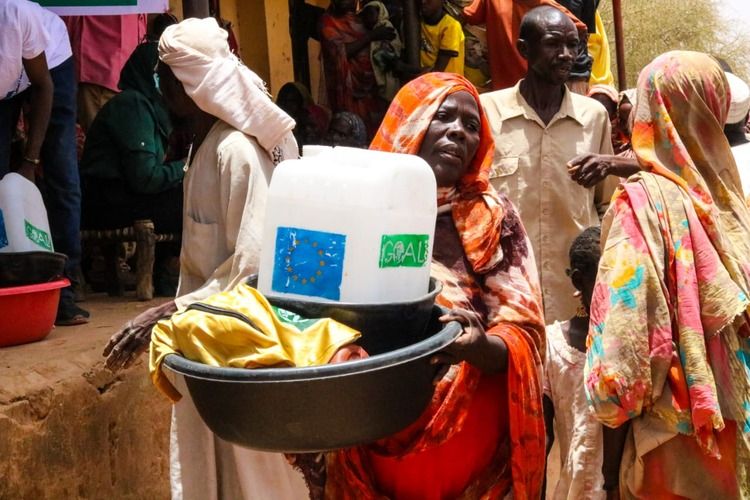
A hygiene and dignity kit distribution for IDPs in North Darfur, Sudan
Displaced communities are also seeking refuge in neighbouring countries, including South Sudan and Chad. Sudan hosts millions of refugees from South Sudan, who were forcibly displaced by the 2013 civil war.
When conflict erupted in Khartoum last April, these refugees began returning to South Sudan to escape the violence. To date, over 518,000 South Sudanese returnees have crossed the border back into South Sudan, accompanied by approximately 139,000 Sudanese refugees.
The returnees and refugees are passing through the Joda border point in Renk County, Upper Nile State. Displaced populations have passed through Renk County in South Sudan for decades. GOAL’s existing presence there has enabled our teams to rapidly scale up our humanitarian response.
GOALies in South Sudan are distributing non-food items such as blankets, tents, jerricans, mosquito nets, solar lamps, cooking utensils, and hygiene kits. GOAL is also running an inpatient therapeutic feeding programme in a nearby hospital in Renk, to provide life-saving treatment for malnutrition to young children, pregnant women, and lactating mothers.
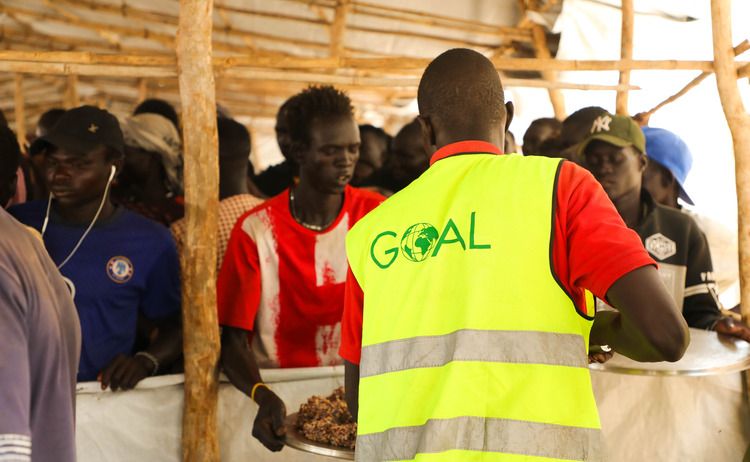
A GOALie distributing hot meals to Sudanese refugees and South Sudanese returnees at the border crossing in Renk, South Sudan
Meanwhile in Chad, 1.4 million Sudanese refugees have crossed the border since last April. Chad is one of the poorest countries in the world but has always been host to a large refugee population from countries such as Cameroon, Nigeria, and the Central African Republic. One in every 17 people living in Chad is a refugee.
The influx of refugees from Sudan is placing enormous strain on the countries already limited humanitarian resources. 6 million people, a third of Chad’s population, requires humanitarian assistance and an estimated 2.9 million people are food insecure. Aid agencies and local governments in Chad are struggling to cope with the increase in demand for humanitarian assistance.
GOAL has partnered with two local agencies, ALIMA and Alerte Santé, to address the increased humanitarian need in Eastern Chad. Teams are providing free medical care and life-saving nutrition support to over 4,700 children, with funding from Irish Aid.
Learn more about GOAL’s work in Sudan.
Ethiopia
An estimated 3.4 million people are internally displaced within Ethiopia. Conflict is the primary driver of displacement and has displaced 2.2 million people, followed by drought, which has displaced approximately 612,250 people.
GOAL has strong relationships with donors and local partners in Ethiopia. This allows our teams to quickly access emergency funding and rapidly respond to sudden-onset crises, including mass displacement.
When displaced populations arrive in their host communities, they often require a significant amount of nutritional support, medical attention, and humanitarian assistance. This sudden and dramatic increase in demand for services can place enormous strain on local systems. GOAL supports local authorities by responding to the emergency needs of newly displaced households.
GOAL mobile health teams provide life-saving medical care and nutritional support to individuals living in displacement camps. GOALies are also helping to improve the quality of life for IDPs by facilitating the construction of dignified shelters, water pumps, blocks of showers, communal latrines, and other sanitation facilities.
Read more about GOAL’s work in Ethiopia.
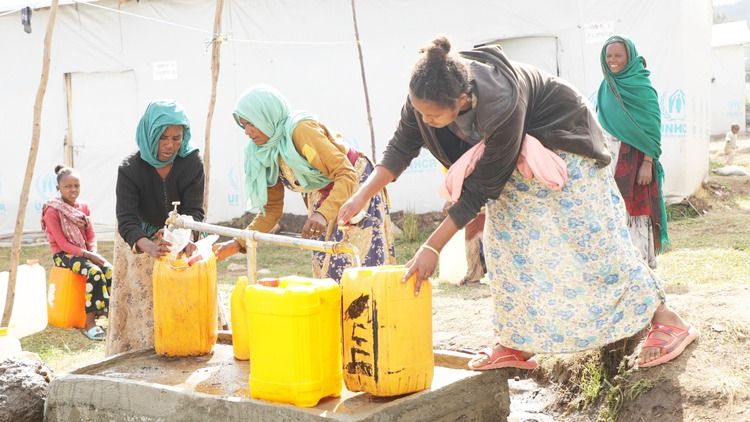
Displaced women in Ethiopia collecting water from a GOAL-funded water station in Debre Birhan IDP camp
